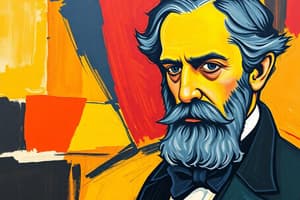Podcast
Questions and Answers
What term describes the unique style created by Charles Dickens?
What term describes the unique style created by Charles Dickens?
Which of the following best describes a reason Dickens' novels are termed 'cinematic'?
Which of the following best describes a reason Dickens' novels are termed 'cinematic'?
What major life event influenced Dickens' view on social conditions?
What major life event influenced Dickens' view on social conditions?
Which character created by Dickens represents a miser?
Which character created by Dickens represents a miser?
What was the collection of short articles published by Dickens called?
What was the collection of short articles published by Dickens called?
What central theme is explored in Oliver Twist?
What central theme is explored in Oliver Twist?
Which of the following novels is primarily a moral tale about redemption?
Which of the following novels is primarily a moral tale about redemption?
In Great Expectations, what aspect of wealth is primarily explored?
In Great Expectations, what aspect of wealth is primarily explored?
What character trait is often found in Dickens' characters?
What character trait is often found in Dickens' characters?
Which characteristics best describe Dickens' novels?
Which characteristics best describe Dickens' novels?
Flashcards
Dickensian
Dickensian
A literary style characterized by vivid descriptions of social issues, eccentric characters, and often humorous situations, usually found in the works of Charles Dickens.
How did Dickens use writing?
How did Dickens use writing?
Charles Dickens used his writing to criticize social injustices and problems in Victorian England.
Why are Dickens' novels called 'cinematic'?
Why are Dickens' novels called 'cinematic'?
The way Dickens structured his stories, with many episodes and events connected, similar to a movie.
How did Dickens create memorable characters?
How did Dickens create memorable characters?
Signup and view all the flashcards
What shaped Dickens' early life?
What shaped Dickens' early life?
Signup and view all the flashcards
Coming-of-age novel
Coming-of-age novel
Signup and view all the flashcards
Caricature
Caricature
Signup and view all the flashcards
Improbable coincidences in Dickens' novels
Improbable coincidences in Dickens' novels
Signup and view all the flashcards
Melodramatic tone
Melodramatic tone
Signup and view all the flashcards
Parallel stories in Dickens' novels
Parallel stories in Dickens' novels
Signup and view all the flashcards
Study Notes
Charles Dickens (1812-1870)
- Born in Portsmouth in 1812
- Had limited formal education
- Forced to work in a factory as a child due to his father's imprisonment for debt
- Became a journalist, using the pen name "Boz"
- Became a parliamentary reporter for The Morning Chronicle in 1833
- Became a professional writer and published many books often based on his own experiences
- Travelled to America and Italy
- Married and had ten children
- Died in 1870
Dickens' Works
- Sketches by Boz (1833-36): A collection of short articles and descriptions of London
- Pickwick Papers (1836-7): Series of tales focused on Mr. Pickwick's adventures, humorously exploring England through the eyes of eccentric characters
- Oliver Twist (1837-9): Explores social criticisms such as the exploitation of children, cruelty of workhouses and the bad living conditions
- Focuses on Oliver Twist's early life in a workhouse and his journey to London, where he becomes involved in a criminal gang, ending with his adoption by a wealthy family
- Key themes include poverty, Victorian morality, and the hardships of the poor
- A Christmas Carol (1843): A ghostly story demonstrating the conversion of a miser to the spirit of Christmas; explores the importance of redemption and kindness
- Dombey and Son (1846): Criticizes the greed for money and power
- David Copperfield (1849-50): A coming-of-age novel exploring the complexities of childhood and the protagonist's growth from childhood to adulthood
- Bleak House (1852-3): Satire of English justice
- Hard Times (1854): Explores the effects of the Industrial Revolution. It is characterized by its sharp criticism of Utilitarianism and its emphasis on the harsh realities of Victorian England
- The protagonist, Thomas Gradgrind, is a strong advocate for Utilitarianism and creates a school which emphasizes facts over imagination and joy.
- Gradgrind's daughter and son's lives become unhappy and detrimental due to this materialistic philosophy.
- Great Expectations (1860): Examines the influence of wealth on a person's moral status; considered a coming-of-age story
Dickens' Style and Characteristics
- Created a style called "Dickensian"
- His plots have become popular with filmmakers because they often use an episodic narrative structure
- His characters are often recognized as character types (ex: Scrooge, Gradgrind)
- His novels often have inventive plots and parallel stories, along with improbable coincidences and melodramatic tones.
- Characters often embody particular vices or virtues and belong to all social classes
Dickens' Social Criticism
- Criticised the bad living conditions of the poor under the Poor Law of 1934
- Condemned the working conditions of the poor
- Criticised the moral consequences of uncontrolled economic growth
Studying That Suits You
Use AI to generate personalized quizzes and flashcards to suit your learning preferences.




